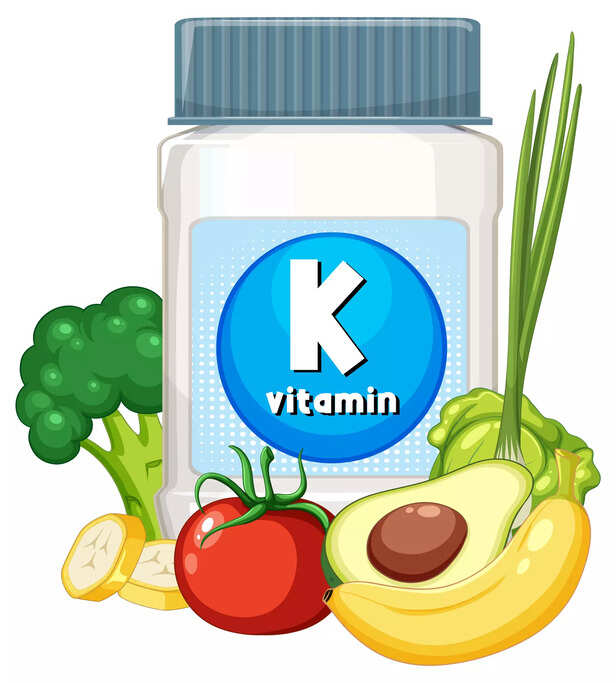Why Your Legs Hurt: The Surprising Role of Vitamin K Deficiency
Vaibhav Kochar | Aug 12, 2025, 10:00 IST
( Image credit : Freepik )
Leg pain is often due to overuse, but vitamin K deficiency can also be a cause. Vitamin K is important for bones, blood flow and muscles. Lack of it can lead to weak bones, poor circulation, and muscle issues. Increase vitamin K intake through leafy greens, cheese, and eggs. Consult a doctor for persistent leg pain.
Most people believe that sore legs are caused by overuse, prolonged standing, or ill-fitting shoes. However, this is not always the case. Deficiencies of important nutrients in the body can create these problems, too. Vitamin K is one of those neglected nutrients that may play its role in keeping our legs healthy.
Vitamin K may not get the limelight that other vitamins like C or D do, but it’s an important vitamin for muscle contraction, blood clotting, and bone health. Not having enough vitamin K can create issues in the body’s ability to direct calcium, which needs to be effectively placed for both bones and blood vessels. Calcium can often lodge in the artery walls instead of in the bones, which can create flow issues and may ultimately lead to aches, pains, swelling, or fatigue in the legs that does not go away, regardless of resting them.

Not having enough Vitamin K won't cause leg pain all of a sudden. The problem builds up over time, and many people fail to see it happening. But when it gets worse, the pain can become a constant issue.

When treating vitamin K deficiency, it will typically be through dietary changes. Two types of vitamin K exist: Vitamin K-1 (phylloquinone), which is present in leafy green vegetables. The second type is Vitamin K-2 (menaquinone), which is found in some animal foods and fermented foods. Both types of vitamin K should be consumed for the protection of your legs.
A supplement may be helpful if your doctor allows it. This is especially so if you are a patient taking blood-thinning medication because of the way that vitamin K impacts blood-clotting capacity.

Leg pain can sometimes be associated with vitamin K, but it isn't always the cause. If you experience sudden leg pain, difficulty walking, or have visible symptoms such as swelling or redness, it is important to see a doctor. You could have conditions that will be better off being dealt with sooner, blood clotting, nerve issues, or blood flow issues.
To understand persistent leg discomfort with symptoms such as unusual swelling, difficulty healing cuts, or bruising easily, doctors might recommend testing vitamin K levels with a blood test. Detecting this can help prevent complications like stiff arteries or fragile bones and can make treatment easier.

Many people dismiss leg pain, thinking it’s nothing serious or just something they can endure. Sometimes, though, it’s the body’s way of signaling that something important might be lacking. Vitamin K is tiny in quantity but has a huge job to do. It supports bone health, strengthens blood vessels, and ensures muscles get what they need to work.
Neglecting this crucial vitamin could make the body weaker over time. Understanding its importance can help keep your legs strong and free of pain as you age. For those facing unexplained leg discomfort, the solution might not lie in medicine. Adding more leafy greens to your diet might be the key.
Explore the latest trends and tips in Health & Fitness, Travel, Life Hacks, Fashion & Beauty, and Relationships at Times Life!
Vitamin K may not get the limelight that other vitamins like C or D do, but it’s an important vitamin for muscle contraction, blood clotting, and bone health. Not having enough vitamin K can create issues in the body’s ability to direct calcium, which needs to be effectively placed for both bones and blood vessels. Calcium can often lodge in the artery walls instead of in the bones, which can create flow issues and may ultimately lead to aches, pains, swelling, or fatigue in the legs that does not go away, regardless of resting them.
How not having enough vitamin K can create leg pain

Vitamin K affects legs
( Image credit : Freepik )
Not having enough Vitamin K won't cause leg pain all of a sudden. The problem builds up over time, and many people fail to see it happening. But when it gets worse, the pain can become a constant issue.
- Weak Bones and Joints: Vitamin K helps keep calcium in your bones, making them strong. Without enough of it, the bones in your legs can grow weaker over time. These can cause stress, pain, or small fractures.
- Blood Flow Change: Vitamin K is important for strong blood vessels. Weak vessels slow blood flow. This might make your legs feel heavy, swollen, or restless.
- Easy Bruising and Slow Healing: Small bumps on your legs could cause dark bruises to appear because your blood doesn’t clot.
- Muscle Cramps and Restlessness: You may be experiencing cramping, twitching, or restlessness in your legs at night, as a result of having low nutrients to enable your leg muscles.
How to Eat your Food Sources of Vitamin K - Ways to Increase Vitamin K

Vitamin K rich foods
( Image credit : Freepik )
When treating vitamin K deficiency, it will typically be through dietary changes. Two types of vitamin K exist: Vitamin K-1 (phylloquinone), which is present in leafy green vegetables. The second type is Vitamin K-2 (menaquinone), which is found in some animal foods and fermented foods. Both types of vitamin K should be consumed for the protection of your legs.
- Vitamin K-1 sources: Kale, spinach, parsley, lettuce - many varieties, broccoli, and cabbage are some foods high in Vitamin K-1.
- Vitamin K-2 Sources: Vitamin K-2 is obtained from cheese, chicken, eggs, or natto - fermented soy food.
A supplement may be helpful if your doctor allows it. This is especially so if you are a patient taking blood-thinning medication because of the way that vitamin K impacts blood-clotting capacity.
Vitamin K impacts the legs

When to seek medical advice
( Image credit : Freepik )
Leg pain can sometimes be associated with vitamin K, but it isn't always the cause. If you experience sudden leg pain, difficulty walking, or have visible symptoms such as swelling or redness, it is important to see a doctor. You could have conditions that will be better off being dealt with sooner, blood clotting, nerve issues, or blood flow issues.
To understand persistent leg discomfort with symptoms such as unusual swelling, difficulty healing cuts, or bruising easily, doctors might recommend testing vitamin K levels with a blood test. Detecting this can help prevent complications like stiff arteries or fragile bones and can make treatment easier.
Listen to Your Body

Keep a check on health
( Image credit : Freepik )
Many people dismiss leg pain, thinking it’s nothing serious or just something they can endure. Sometimes, though, it’s the body’s way of signaling that something important might be lacking. Vitamin K is tiny in quantity but has a huge job to do. It supports bone health, strengthens blood vessels, and ensures muscles get what they need to work.
Neglecting this crucial vitamin could make the body weaker over time. Understanding its importance can help keep your legs strong and free of pain as you age. For those facing unexplained leg discomfort, the solution might not lie in medicine. Adding more leafy greens to your diet might be the key.
Explore the latest trends and tips in Health & Fitness, Travel, Life Hacks, Fashion & Beauty, and Relationships at Times Life!
Frequently Asked Questions (FAQs)
- Can exercise increase the body’s need for vitamin K?
Yes, intense workouts can increase demand due to muscle repair needs. - Is vitamin K deficiency linked to slow healing of leg injuries?
Yes, it can delay recovery because blood clotting is impaired. - Can vitamin K deficiency cause numbness or tingling in the legs?
Indirectly, poor circulation from deficiency may lead to such sensations. - Do certain medications reduce vitamin K levels in the body?
Yes, antibiotics and blood thinners can interfere with vitamin K absorption.
